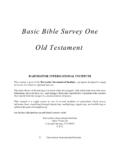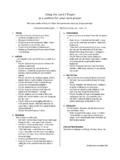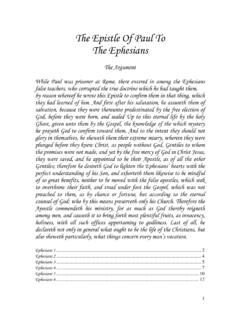Transcription of Forgiveness Six Types - The Purpose Driven Church
1 1-18 Understanding the Six Types of Forgiveness Written by: Dr. Jerry E. McKeehan Forgiveness , C. S. Lewis once observed, is a beautiful word, until you have something to forgive. Reading C. S. Lewis quote reminds me a story about a Sunday school teacher. In the middle of the lesson one Sunday, two boys in the back of the room were arguing. The teacher stopped the class and asked what the problem was. One of the boys replied that on the way to Sunday school the other had hit him. This is a great opportunity to teach them about Forgiveness , the teacher thought. He called the two boys to the front of the class and emphasized how much God wants us to forgive each other. Then the teacher asked the all-important question. Brian, will you forgive Luke? Sure, Brian said. He then hauled off and punched Luke in the stomach. Wait a minute, the teacher yelled, grabbing Brian by the arm. I asked you to forgive Luke, not hit him. I will forgive him, Brian protested, but I had to get even with him first.
2 As C. S. Lewis said Forgiveness is a beautiful word SCRIPTURES MOST OFTEN QUOTED ON Forgiveness Luke 17:3-4 (3) Be on your guard! If your brother sins, rebuke him; and if he repents, forgive him. (4) And if he sins against you seven times a day, and returns to you seven times, saying, I repent, forgive him. (NASB) Matthew 18:21-35 (21) Then Peter came and said to Him, Lord, how often shall my brother sin against me and I forgive him? Up to seven times? (22) Jesus *said to him, I do not say to you, up to seven times, but up to seventy times seven. (23) For this reason the kingdom of heaven may be compared to a king who wished to settle accounts with his slaves. (24) When he had begun to settle {them,} one who owed him ten thousand talents was brought to him. (25) But since he did not have {the means} to repay, his lord commanded him to be sold, along with his wife and children and all that he had, and repayment to be made.
3 (26) "So the slave fell {to the ground} and prostrated himself before him, saying, 'Have patience with me and I will repay you everything.' (27) "And the lord of that slave felt compassion and released him and forgave him the debt. 2-18 (28) "But that slave went out and found one of his fellow slaves who owed him a hundred denarii; and he seized him and {began} to choke {him,} saying, 'Pay back what you owe.' (29) "So his fellow slave fell {to the ground} and {began} to plead with him, saying, 'Have patience with me and I will repay you.' (30) "But he was unwilling and went and threw him in prison until he should pay back what was owed. (31) "So when his fellow slaves saw what had happened, they were deeply grieved and came and reported to their lord all that had happened. (32) "Then summoning him, his lord *said to him, 'You wicked slave, I forgave you all that debt because you pleaded with me. (33) 'Should you not also have had mercy on your fellow slave, in the same way that I had mercy on you?
4 ' (34) "And his lord, moved with anger, handed him over to the torturers until he should repay all that was owed him. (35) "My heavenly Father will also do the same to you, if each of you does not forgive his brother from your heart." Ephesians 4:32: Be kind to one another, tender-hearted, forgiving each other, just as God in Christ also has forgiven you. Colossians 3:13-14 (13) bearing with one another, and forgiving each other, whoever has a complaint against anyone; just as the Lord forgave you, so also should you. (14) Beyond all these things {put on} love, which is the perfect bond of unity. Matthew 6:14: "For if you forgive others for their transgressions, your heavenly Father will also forgive you. Matthew 9:1-8: (1) Getting into a boat, Jesus crossed over {the sea} and came to His own city. (2) And they brought to Him a paralytic lying on a bed. Seeing their faith, Jesus said to the paralytic, "Take courage, son; your sins are forgiven.
5 " (3) And some of the scribes said to themselves, "This {fellow} blasphemes." (4) And Jesus knowing their thoughts said, "Why are you thinking evil in your hearts? (5) "Which is easier, to say, 'Your sins are forgiven,' or to say, 'Get up, and walk'? (6) "But so that you may know that the Son of Man has authority on earth to forgive sins"--then He *said to the paralytic, "Get up, pick up your bed and go home." (7) And he got up and went home. (8) But when the crowds saw {this,} they were awestruck, and glorified God, who had given such authority to men. Mark 11:25: "Whenever you stand praying, forgive, if you have anything against anyone, so that your Father who is in heaven will also forgive you your transgressions. Luke 6:37: "Do not judge, and you will not be judged; and do not condemn, and you will not be condemned; pardon, and you will be pardoned. 3-18 Luke 11:4: 'And forgive us our sins, For we ourselves also forgive everyone who is indebted to us.
6 And lead us not into temptation.' " John 20:23: "If you forgive the sins of any, {their sins} have been forgiven them; if you retain the {sins} of any, they have been retained." Luke 23:34: But Jesus was saying, "Father, forgive them; for they do not know what they are doing." And they cast lots, dividing up His garments among themselves. BIBLE VERSUS NEEDED IN UNDERSTANDING Forgiveness : 1 John 1:9: If we confess our sins, He is faithful and righteous to forgive us our sins and to cleanse us from all unrighteousness. 1 John 2:1: My little children, I am writing these things to you so that you may not sin. And if anyone sins, we have an Advocate with the Father, Jesus Christ the righteous; SUPPOSED CONTRADICTIONS God s Forgiveness of believers as taught in 1 John 1:9 is conditional. It is dependent upon confession of sins. In contrast, and in apparent contradiction, in 1 John 2:1 we have an Advocate, Jesus Christ, who intercedes for us unconditionally, every time we sin, providing judicial Forgiveness that is unconditional.
7 By studying this apparent contradiction and the biblical context, we discover that God grants two kinds of Forgiveness to believers: repetitive judicial Forgiveness , and repetitive fellowship Forgiveness (dependent upon confession of sins). CONDITIONAL VERSUS UNCONDITIONAL Jesus says, Be on your guard! If your brother sins, rebuke him; and if he repents, forgive him (Luke 17:3). Notice that the Forgiveness in this verse is conditional you are to grant Forgiveness to those who offend you if and when they repent. In contrast (and in apparent contradiction), in Mark 11:25 believers are to forgive unconditionally. Jesus says, Whenever you stand praying, forgive, if you have anything against anyone, so that your Father who is in heaven will also forgive you your transgressions (Mark 11:25 NASB). Or, in modern English, When you are praying, and you remember that you are angry with another person about something, then forgive that person.
8 Forgive them so that your Father in heaven will also forgive your sins. (Mark 11:25, ERV). 4-18 Just as in the biblical teaching of God s Forgiveness of believers, in the teaching of Forgiveness of others we see apparent contradictions. In one scripture passage, our Forgiveness is to be conditional (dependent upon repentance by our offender), and in another passage our Forgiveness is to be unconditional (repentance by the one who has offended us is not required). What a striking parallel! Could it be that there are two kinds of Forgiveness that believers grant? Could it be that these two kinds of Forgiveness we can grant are similar to the two kinds of Forgiveness that God grants us after we have been justified ? We have seen that different conditions (conditional and unconditional) distinguish the Forgiveness of Mark 11:25 from that of Luke 17:3. But we can also find other differences between these two teachings on Forgiveness . DIFFERENT COMMUNICATIONS, DIFFERENT DIRECTIONS In Mark 11:24, we see that the subject is prayer.
9 Then in Mark 11:25, Jesus continues to teach about prayer. We notice that the forgiving of Mark 11:25 is accomplished while praying, and we can assume that it is accomplished by praying. In contrast, instead of being accomplished through prayer, the Forgiveness of Luke 17:3 is accomplished by speaking to the offender by responding to his repentance with the words, Yes, I forgive you. Considering again the difference in the means of communication (prayer to God versus words spoken to an offender), the Forgiveness of Mark 11:25 is a vertical transaction between the offended person and God, and the Forgiveness of Luke 17:3 is a horizontal transaction between the offender and the one he offended. OFFENDER S PRESENCE NOT REQUIRED Further, in Mark 11:25, where is the offender? And where is the repentance in Mark 11:25 that would make the offender eligible for the Forgiveness of Luke 17:3? Neither the presence nor the repentance of the offender is required for the Forgiveness of Mark 11:25.
10 Instead, a believer is praying, perhaps with no one near him. The offender may be far away, and he may be unrepentant. But Jesus says, Forgive. The Forgiveness of Mark 11:25 must be different from the Forgiveness of Luke 17:3. OFFENDER NOT FORGIVEN If you will read again the two translations of Mark 11:25 that were given above, neither one says forgive him. This is because the word him is not in the Greek New Testament. Since we are instructed to pray and release (literal translation), 5-18 instead of being told to pray and release him, it seems logical to believe that the omission of him by the Holy Spirit is to help us see that the Forgiveness of Mark 11 :25 is a different kind of Forgiveness than the Forgiveness of Luke 17:3 in which the offender himself is forgiven. EXAMINING THE DIFFERENCES Summarizing the arguments presented above, the Forgiveness of Mark 11:25 is different from the Forgiveness of Luke 17:3 because: The conditions are different unconditional Forgiveness versus conditional Forgiveness (dependent upon repentance).







